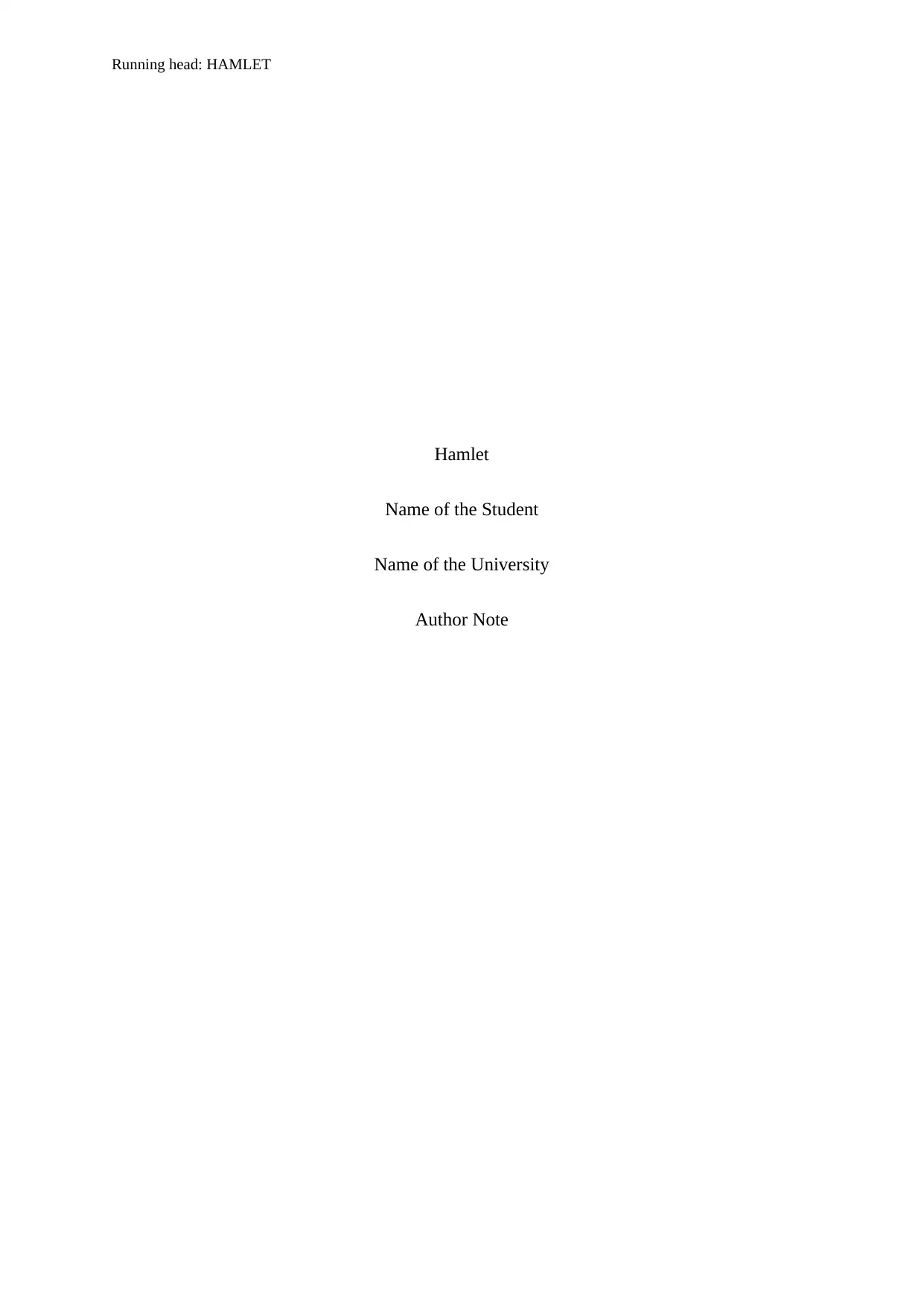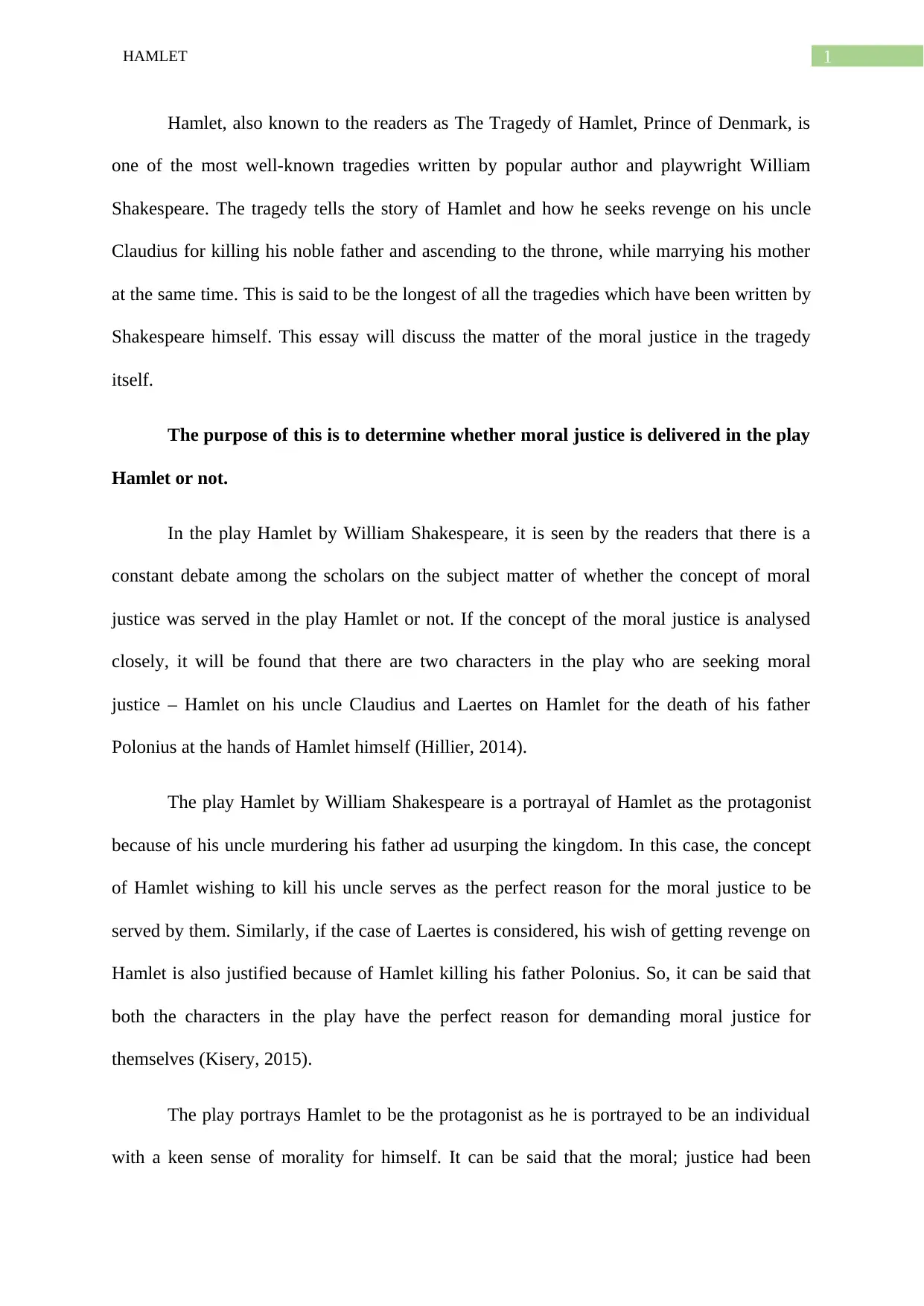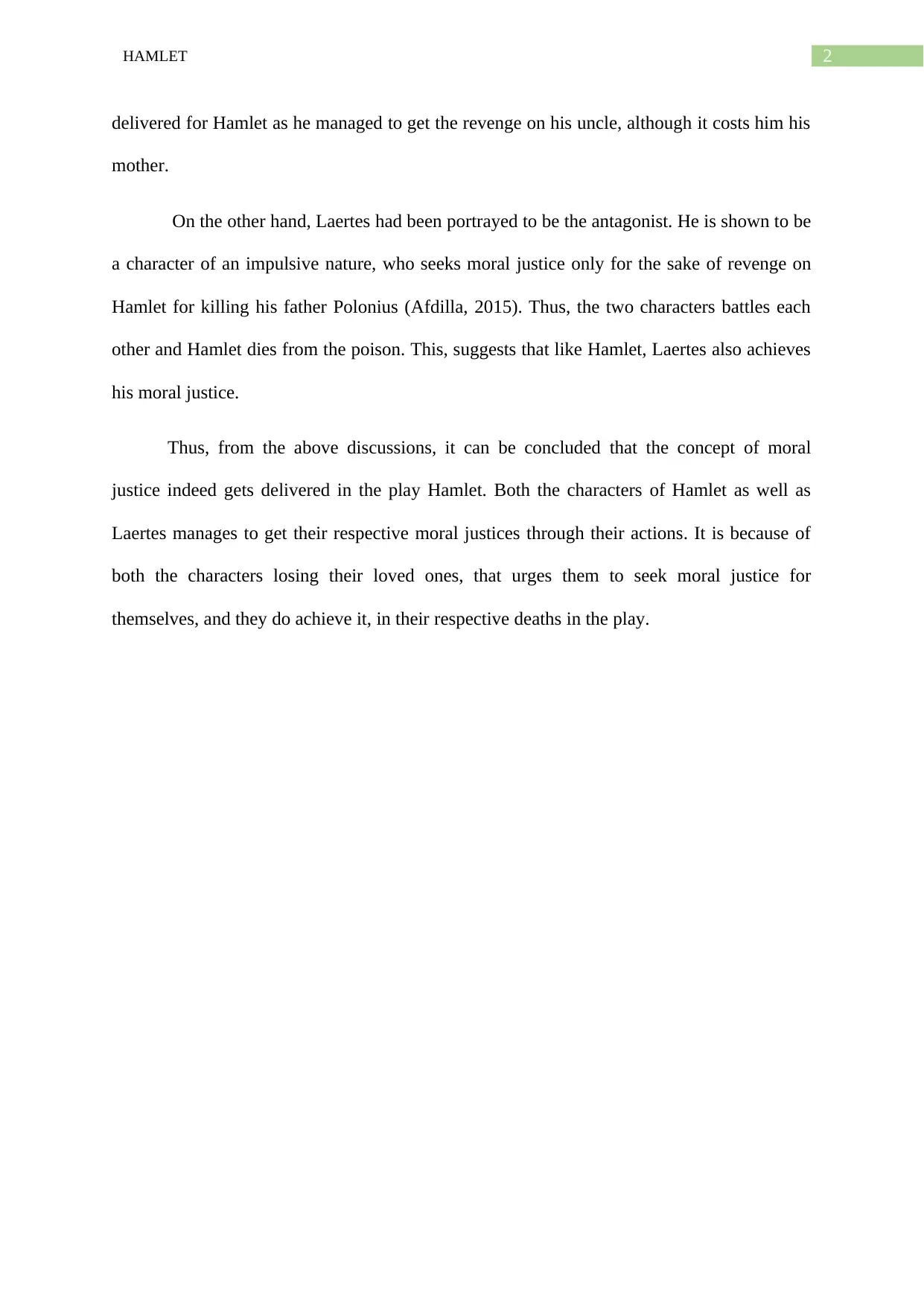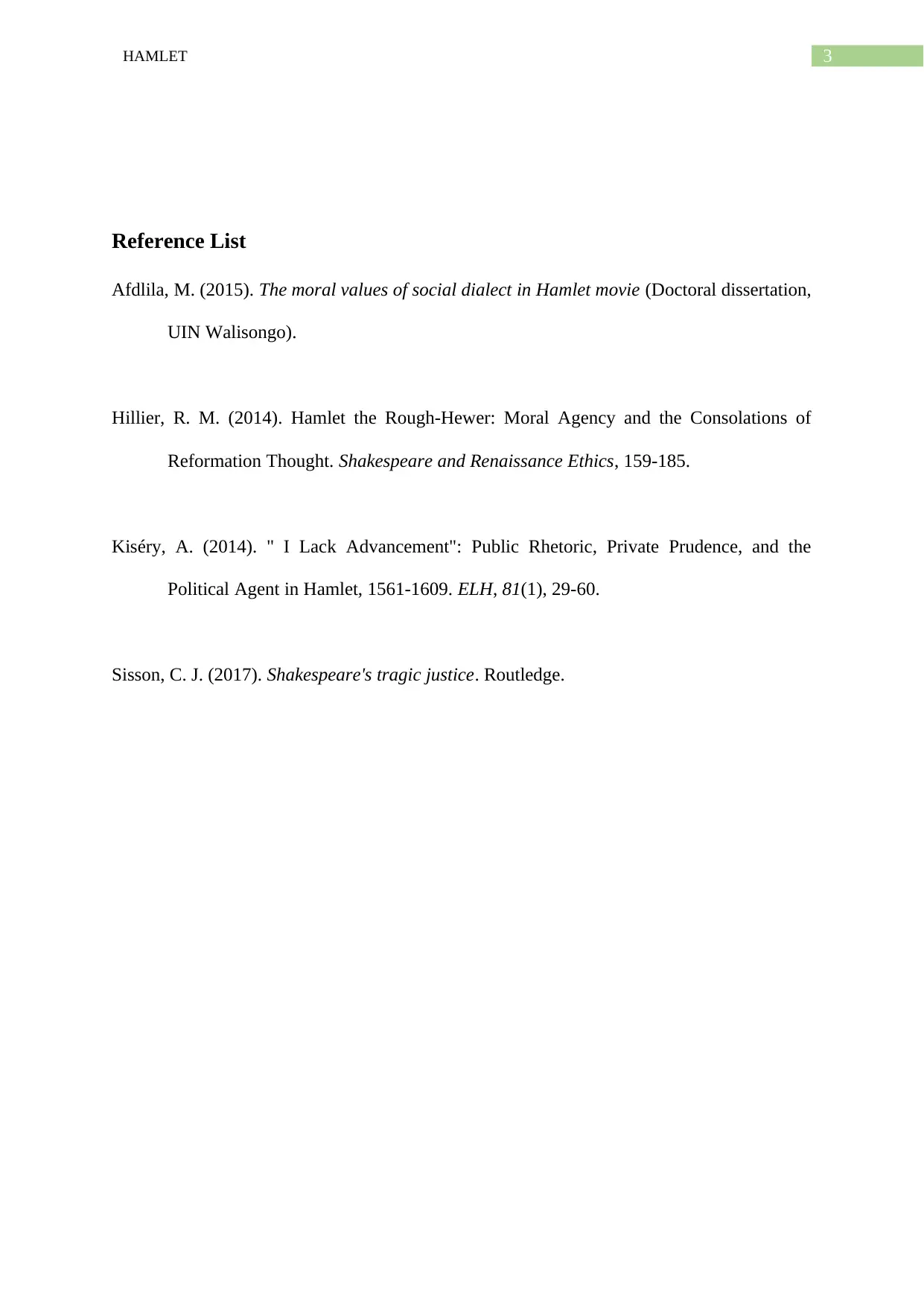Moral Justice: An In-depth Analysis of Shakespeare's Hamlet
VerifiedAdded on 2022/11/29
|4
|676
|367
Essay
AI Summary
This essay delves into the concept of moral justice in William Shakespeare's tragedy, Hamlet. It examines the perspectives of Hamlet and Laertes, both seeking retribution for the loss of their fathers. Hamlet seeks revenge on his uncle Claudius for murdering his father and usurping the throne, while Laertes seeks vengeance on Hamlet for the death of Polonius. The essay analyzes whether moral justice is ultimately served in the play, considering the motivations and actions of both characters. It concludes that both Hamlet and Laertes achieve their respective moral justices through their actions, ultimately leading to their deaths.

Running head: HAMLET
Hamlet
Name of the Student
Name of the University
Author Note
Hamlet
Name of the Student
Name of the University
Author Note
Paraphrase This Document
Need a fresh take? Get an instant paraphrase of this document with our AI Paraphraser

1HAMLET
Hamlet, also known to the readers as The Tragedy of Hamlet, Prince of Denmark, is
one of the most well-known tragedies written by popular author and playwright William
Shakespeare. The tragedy tells the story of Hamlet and how he seeks revenge on his uncle
Claudius for killing his noble father and ascending to the throne, while marrying his mother
at the same time. This is said to be the longest of all the tragedies which have been written by
Shakespeare himself. This essay will discuss the matter of the moral justice in the tragedy
itself.
The purpose of this is to determine whether moral justice is delivered in the play
Hamlet or not.
In the play Hamlet by William Shakespeare, it is seen by the readers that there is a
constant debate among the scholars on the subject matter of whether the concept of moral
justice was served in the play Hamlet or not. If the concept of the moral justice is analysed
closely, it will be found that there are two characters in the play who are seeking moral
justice – Hamlet on his uncle Claudius and Laertes on Hamlet for the death of his father
Polonius at the hands of Hamlet himself (Hillier, 2014).
The play Hamlet by William Shakespeare is a portrayal of Hamlet as the protagonist
because of his uncle murdering his father ad usurping the kingdom. In this case, the concept
of Hamlet wishing to kill his uncle serves as the perfect reason for the moral justice to be
served by them. Similarly, if the case of Laertes is considered, his wish of getting revenge on
Hamlet is also justified because of Hamlet killing his father Polonius. So, it can be said that
both the characters in the play have the perfect reason for demanding moral justice for
themselves (Kisery, 2015).
The play portrays Hamlet to be the protagonist as he is portrayed to be an individual
with a keen sense of morality for himself. It can be said that the moral; justice had been
Hamlet, also known to the readers as The Tragedy of Hamlet, Prince of Denmark, is
one of the most well-known tragedies written by popular author and playwright William
Shakespeare. The tragedy tells the story of Hamlet and how he seeks revenge on his uncle
Claudius for killing his noble father and ascending to the throne, while marrying his mother
at the same time. This is said to be the longest of all the tragedies which have been written by
Shakespeare himself. This essay will discuss the matter of the moral justice in the tragedy
itself.
The purpose of this is to determine whether moral justice is delivered in the play
Hamlet or not.
In the play Hamlet by William Shakespeare, it is seen by the readers that there is a
constant debate among the scholars on the subject matter of whether the concept of moral
justice was served in the play Hamlet or not. If the concept of the moral justice is analysed
closely, it will be found that there are two characters in the play who are seeking moral
justice – Hamlet on his uncle Claudius and Laertes on Hamlet for the death of his father
Polonius at the hands of Hamlet himself (Hillier, 2014).
The play Hamlet by William Shakespeare is a portrayal of Hamlet as the protagonist
because of his uncle murdering his father ad usurping the kingdom. In this case, the concept
of Hamlet wishing to kill his uncle serves as the perfect reason for the moral justice to be
served by them. Similarly, if the case of Laertes is considered, his wish of getting revenge on
Hamlet is also justified because of Hamlet killing his father Polonius. So, it can be said that
both the characters in the play have the perfect reason for demanding moral justice for
themselves (Kisery, 2015).
The play portrays Hamlet to be the protagonist as he is portrayed to be an individual
with a keen sense of morality for himself. It can be said that the moral; justice had been

2HAMLET
delivered for Hamlet as he managed to get the revenge on his uncle, although it costs him his
mother.
On the other hand, Laertes had been portrayed to be the antagonist. He is shown to be
a character of an impulsive nature, who seeks moral justice only for the sake of revenge on
Hamlet for killing his father Polonius (Afdilla, 2015). Thus, the two characters battles each
other and Hamlet dies from the poison. This, suggests that like Hamlet, Laertes also achieves
his moral justice.
Thus, from the above discussions, it can be concluded that the concept of moral
justice indeed gets delivered in the play Hamlet. Both the characters of Hamlet as well as
Laertes manages to get their respective moral justices through their actions. It is because of
both the characters losing their loved ones, that urges them to seek moral justice for
themselves, and they do achieve it, in their respective deaths in the play.
delivered for Hamlet as he managed to get the revenge on his uncle, although it costs him his
mother.
On the other hand, Laertes had been portrayed to be the antagonist. He is shown to be
a character of an impulsive nature, who seeks moral justice only for the sake of revenge on
Hamlet for killing his father Polonius (Afdilla, 2015). Thus, the two characters battles each
other and Hamlet dies from the poison. This, suggests that like Hamlet, Laertes also achieves
his moral justice.
Thus, from the above discussions, it can be concluded that the concept of moral
justice indeed gets delivered in the play Hamlet. Both the characters of Hamlet as well as
Laertes manages to get their respective moral justices through their actions. It is because of
both the characters losing their loved ones, that urges them to seek moral justice for
themselves, and they do achieve it, in their respective deaths in the play.
⊘ This is a preview!⊘
Do you want full access?
Subscribe today to unlock all pages.

Trusted by 1+ million students worldwide

3HAMLET
Reference List
Afdlila, M. (2015). The moral values of social dialect in Hamlet movie (Doctoral dissertation,
UIN Walisongo).
Hillier, R. M. (2014). Hamlet the Rough-Hewer: Moral Agency and the Consolations of
Reformation Thought. Shakespeare and Renaissance Ethics, 159-185.
Kiséry, A. (2014). " I Lack Advancement": Public Rhetoric, Private Prudence, and the
Political Agent in Hamlet, 1561-1609. ELH, 81(1), 29-60.
Sisson, C. J. (2017). Shakespeare's tragic justice. Routledge.
Reference List
Afdlila, M. (2015). The moral values of social dialect in Hamlet movie (Doctoral dissertation,
UIN Walisongo).
Hillier, R. M. (2014). Hamlet the Rough-Hewer: Moral Agency and the Consolations of
Reformation Thought. Shakespeare and Renaissance Ethics, 159-185.
Kiséry, A. (2014). " I Lack Advancement": Public Rhetoric, Private Prudence, and the
Political Agent in Hamlet, 1561-1609. ELH, 81(1), 29-60.
Sisson, C. J. (2017). Shakespeare's tragic justice. Routledge.
1 out of 4
Related Documents
Your All-in-One AI-Powered Toolkit for Academic Success.
+13062052269
info@desklib.com
Available 24*7 on WhatsApp / Email
![[object Object]](/_next/static/media/star-bottom.7253800d.svg)
Unlock your academic potential
Copyright © 2020–2026 A2Z Services. All Rights Reserved. Developed and managed by ZUCOL.




